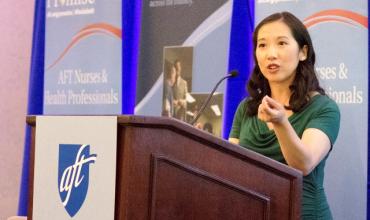Every day, AFT members are fighting back against the wildfire of opioid addiction and its unacceptable toll on our communities. Nationwide, deaths from overdoses of opioids, heroin and synthetic painkillers have spiked upward—almost doubling in just a year. In 2015, more than 33,000 Americans died from opioid overdoses, according to the National Institute on Drug Abuse, and preliminary estimates show that overdoses killed about 60,000 Americans in 2016, which the New York Times reports would be the largest annual increase in U.S. history.
Into this maelstrom walked Dr. Leana Wen (pictured below), Baltimore's commissioner of health, known for her innovative programs to tackle the problem. The number of deaths from opioid overdose in Baltimore has increased 20 times over since 2013, and the city's hotline is getting a thousand calls a week, Wen told AFT members this month during a joint session of the annual conferences for AFT Public Employees and AFT Nurses and Health Professionals.
"We're all on the frontlines trying to do the right thing," she said. "What bothers me when it comes to the opioid epidemic is the number of people dying from overdose. Patients come in seeking help for their addiction, but we don't see addiction in the same way as we do other medical emergencies."
To Wen, drug addiction is a disease just like heart disease. But not everyone thinks like a physician. And not even all physicians think like Wen.
"It's time to be honest about the stigma of addiction," she said. "When the individuals who are dying are poor or from the inner city, then addiction is a choice or a moral failing." The conversation around addiction is changing, she said, "but we need to be honest about where we came from. Now that people who are dying are from suburban and rural areas, and are wealthy and white, suddenly it's a disease where you can check yourself in and get treatment."
Last year, Wen issued a blanket prescription throughout Baltimore for naloxone, a lifesaving antidote to heroin overdose, and the city is offering training on street corners and in bars. "Since that time, we have saved over 800 lives in our city," she said. "We should be able to get this medication in everyone's hands."
Every life is worth saving, Wen said, and we must fight stigma with science: "The stigma of addiction causes some to say, 'Why give naloxone; it will only make people use heroin more.' That's like saying, 'Why administer an EpiPen for a peanut allergy; it'll make them eat more peanuts.' I hear this rhetoric all the time. It doesn't make sense, and it's not based on science."
When companies and industries lobby against federal regulations, they call them "job-killing." But lack of regulation, which lets drug companies use deceptive marketing to flood the market with opioids, is literally killing people. In response, more than a dozen states and cities have filed lawsuits charging pharmaceutical companies with deceiving doctors about the dangers of addiction to opioids.
In her talk to AFT members, Wen noted that Baltimore was one of the first to start a needle exchange program. In 1994, the rate of HIV from intravenous drug use was 63 percent; by 2014, it had plummeted to 7 percent. "We need to talk about those numbers," she said. "In a time when our core values are being threatened, we have to talk about science. We need to talk about the impact on people."
Wen also offered this advice in the fight against the opioid epidemic: Follow evidence-based practices, change our language when it comes to addiction, and call people out when they use rhetoric that isn't true or when they don't follow up their talk with action. "This is the time for us on the frontline to fight."
[Adrienne Coles, Annette Licitra]

